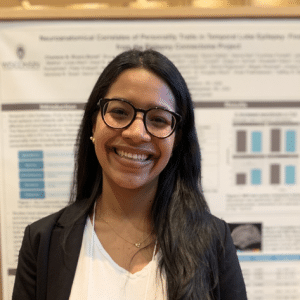Hello! My name is Charlene and I am a Latina in STEM. I am a 5th year PhD candidate at the University of Wisconsin-Madison, where I work in two different projects that share the same goal. In general, I use Magnetic Resonance Imaging (MRI) and behavioral tests to investigate brain connectivity in relation to depression and the personality trait neuroticism. For my main project, I study depression and neuroticism in people with Temporal Lobe Epilepsy (TLE), which is a seizure disorder. People with TLE have a higher incidence of depression and higher neuroticism due to the focus of their seizure. In my research, I aim to understand the neural basis of this co-morbidity. For my second project, I study the effects of brief increase of a steroid hormone called cortisol in brain connectivity in women with depression.

What my week looks like depends on which project I am working on and what stage of the project I am on. Typically, a week includes reading papers related to my field, preparing MRI images to be analyzed, writing scripts, and analyzing the data. There is always a lot of troubleshooting for most steps. My favorite weeks are the ones that include writing about the findings or preparing them to be presented in a conference or meeting.
I’ve really enjoyed doing science outreach and mentoring underrepresented minorities. I have had the opportunity to visit schools and participate in science festivals to teach kids about the brain. I’ve also mentored undergraduate students in both research studies and professional development. Sparking an interest in science in kids, and motivating underrepresented minorities to pursue a career in STEM are some of the things I’ve enjoyed the most.


The most challenging part of my PhD has been learning how to adapt and re-direct when things don’t go as expected. That has been true for both the scientific research but also the path through my graduate studies. Not everything goes as expected, sometimes experiments fail or grants get rejected, but even those moments are teaching experiences I have used to grow as a scientist.

My university fosters collaboration, which has allowed me to integrate multiple areas I like into one research project with the guidance of multiple faculty members. UW Madison also provides space to grow in different areas other than research such as teaching, outreach and science communication by offering certificates and minors.
In my free time I enjoy hiking, playing volleyball, dancing and singing karaoke.
Follow her on Twitter using the link below:

